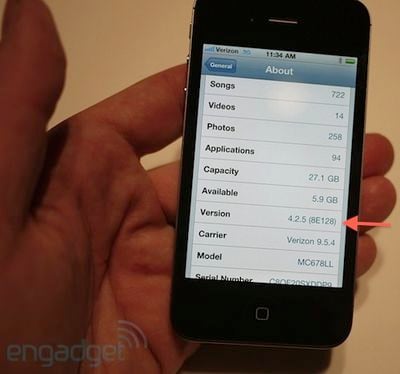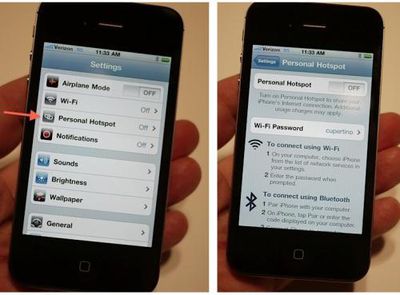With Verizon having announced today that it will begin offering the iPhone early next month and event attendees getting their first hands-on experiences with the device, a number of details have surfaced that are worth noting:
- Personal Hotspot: The Verizon iPhone 4 supports personal hotspot services, allowing up to five devices to share the phone's 3G data connection. Configuration options for the hotspot functionality are cleanly located within the iPhone's standard Settings application rather than in a separate application.
Verizon has not announced pricing for the iPhone 4 data plans, although the carrier has been rumored to be utilizing its standard data packages for on-phone usage, which include an option for unlimited data at $29.99 per month. Hotspot data pricing, however, remains unknown, as the carrier currently charges users of many of its smartphones an additional $20 per month for a separate 2 GB data allotment for personal hotspot use, although some devices such as those from Palm include a 5 GB hotspot allotment with no extra monthly charges.
- Antenna Design: As we noted in our initial article on the announcement, Apple has in fact tweaked the antenna design on the CDMA iPhone 4 to accommodate the different technology. According to Ars Technica, the Verizon iPhone exhibits no visible signal loss when gripping the edges of the phone, although even on the GSM iPhone 4 reproducibility of the issue varied depending in large part on signal strength.
Ars contributor Chris Foresman reported that bridging the remaining gap on the Verizon iPhone (using the "death grip," he says) did not result in any kind of CDMA signal attenuation. He also placed a call while death gripping and said that there was no noticeable signal loss.

- iOS 4.2.5: The demo units of the Verizon iPhone 4 on display at the event are running a special version of the iOS operating system known as iOS 4.2.5, compared to iOS 4.2.1 found on GSM versions of the device. The new version has clearly been developed to support some of the Verizon- and CDMA-specific changes, including the personal hotspot functionality. It is unknown what version of iOS the Verizon iPhone will finally ship with next month.
- Cases and Bumpers: As noted by TUAW, slight shifts in the placement of physical buttons on the Verizon iPhone, primarily a change in the position of the mute switch to accommodate the new antenna design, mean that many current iPhone 4 cases and bumpers will not fit the Verizon version.
- No SIM-Card Slot: One other distinguishing physical difference between the GSM and CDMA iPhone 4 models is the lack of a SIM-card slot in the side of the Verizon version, as CDMA technology does not require the use of a removable SIM-card as with GSM technology. A parts leak last week claimed to be from either the CDMA iPhone 4 or the iPhone 5 accurately showed the locations of the new breaks in the frame of the CDMA version, but also included a SIM-card slot.
- White iPhone 4 Images Removed: While not strictly related to the Verizon iPhone 4, Apple appears to have taken the opportunity of the Verizon iPhone introduction to essentially scrub its site entirely of images showing the white iPhone 4. Apple had dramatically scaled back its usage of the white iPhone 4 in promotional images following an October announcement that the model had been delayed until spring 2011, but some references had remained until today.
























